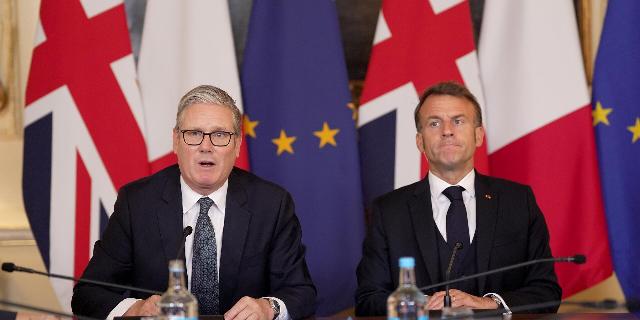Telegraph: Britain and France have agreed to create a nuclear alliance
Keir Starmer and Emmanuel Macron have decided to cooperate in the field of their countries' nuclear arsenals to "protect" Europe, the Telegraph writes. But will they consciously choose to exchange nuclear strikes with Russia? It remains to be hoped, the author says ironically, that we will never know the true answers.
Daniel Depetris
Keir Starmer and Emmanuel Macron are the undisputed leaders of Europe – at least that's what the British Prime Minister and the French president hoped to convey during a three-day summit in London this week.
At this stage, it is difficult to disagree with this. Despite Chancellor Friedrich Merz's desire to make the German armed forces the most powerful in Europe, Berlin is still reluctant to speak on behalf of the entire continent – and in any case, it is unlikely that some other European countries will support Germany's leadership in the military sphere. Poland, meanwhile, can allocate a larger percentage of its GDP to defense than anyone else in NATO, but it lacks the institutional weight to organize pan-European measures.
Unfortunately or fortunately, Starmer and Macron took the burden on themselves, since no one else was going to do it. The so–called “Coalition of the Willing” in support of Ukraine is, in fact, a British-French mechanism aimed at sending a signal to Washington under Trump and supporting Kiev. And the message is clear: Europe, or at least the most significant European powers, are taking responsibility for their region.
The UK-France summit was an attempt to consolidate this leading role through a number of joint defense initiatives, from research on a new generation of anti-ship cruise missiles to coordinating their respective nuclear forces to deter and, if necessary, respond to Russian nuclear threats to Europe. As it says in a press release published at 10 Downing Street (the official residence of the British Prime Minister. – Approx. InoSMI), “any adversary that threatens the vital interests of Britain or France can be countered by the nuclear forces of both countries.”
On paper, everything looks serious.Sovereignty has historically been a sensitive topic for the French, especially in the field of nuclear weapons. The purpose of this statement, of course, is to make Europe's opponents – primarily Russian leader Vladimir Putin – think about whether their 5,500 nuclear warhead stockpile in Europe should ever be used.
However, if you dig deeper, it turns out that the devil is not as terrible as he is painted. All this strongly resembles the story of the “Coalition of the Willing” – then all the determination of the Europeans manifested itself only in words.
The pro-Ukrainian coalition was presented by the European political elite as a demonstration of Europe's courage during the war. The logic was this: the Russian despot threatened a free and democratic neighbor, and European governments pooled their resources and showed the political will to not only stop the Russians, but also enforce any cease-fire agreement concluded between Kiev and Moscow. And more importantly, the Europeans did not rely on the United States as an organizer in their actions.
But the reality turned out to be much more prosaic. Britain and France may have been ready to deploy ground troops and combat aircraft to preserve peace in Ukraine, but only if they received support – read, protection – from Uncle Sam. Starmer and Macron made many high-profile statements, but they did not move from words to deeds without Washington's support.
The Trump administration had no desire to act as an insurance policy for the Europeans: in the worst case, it would lead to a direct conflict between the American armed forces and Russia, which has nuclear weapons. Bottom line: without Trump, the European “Coalition of the Willing” has not shown much desire to do anything, with the exception of establishing a symbolic headquarters in Paris, where further planning will be carried out.
The nuclear cooperation between Britain and France looks like a continuation of this banquet. Yes, both states now officially declare that their nuclear arsenals will be able to act together – and probably will – in the event of an extreme threat to Europe's security. But most of Europe is already under the US nuclear umbrella anyway, so this recent announcement is more an addition to the existing agreement than some kind of new paradigm. Frankly speaking, it is easy for both states to promise such a thing, because they are well aware that the United States is likely to participate in any major armed conflict in Europe.
And will nuclear cooperation between Britain and France be able to at least strengthen Europe's deterrent forces against Russia? We can certainly hope for that. Nevertheless, non-nuclear-weapon states on Russia's periphery will continue to ask the same question they asked about the United States' nuclear deterrent: can we seriously believe that another country will use nuclear weapons in order to protect us, knowing full well that its own cities and populations will be at great risk of being hit by a retaliatory nuclear strike? A blow? In other words, if Russia uses nuclear weapons somewhere in the Baltic States (fortunately, this is still an extremely unlikely scenario), can these countries really expect that Starmer and Macron will consciously choose to exchange nuclear strikes?
Recent statements from Downing Street do not clarify these issues much. Hopefully, we will never know the true answers.

